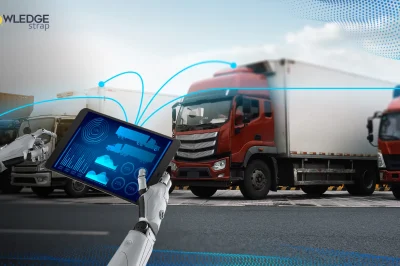Envision overseeing a fleet of vehicles that respond to orders and anticipate needs before problems arise. AI is transforming fleet management with capabilities such as real-time traffic predictions, weather disruption forecasts, and data analysis to optimize routes and avoid delays. AI ensures that your fleet is dynamically adjusted and enhances operational efficiency.
Predictive maintenance is one of the most significant aspects of AI in fleet management. Through machine learning insights from past car data, AI detects potential issues in advance so you can take preventive action before more expensive repairs come about. This evolution of management from reactive to proactive saves costs and improves the vehicles’ time and reliability.
In this blog, we will discuss how AI is revolutionizing fleet management, resulting in more efficient and safer operations.
What is Fleet Management?
Fleet management entails managing a company’s fleet to ensure smooth operations, minimize expenses, and guarantee safety. It’s a vital function for businesses whose operations involve moving goods or services. Fleet management ensures improved productivity and reduced operational risks.
Key benefits include:
- Better driver and vehicle safety
- Reduced carbon footprint
- Improved compliance with previous levels
- Smarter fuel management
- Vehicle sourcing process improvements
Fleet managers manage a variety of tasks, including maintaining maintenance schedules, monitoring fuel consumption, managing driver behavior, and optimizing route planning for seamless operations.
The Role of AI/ML in Fleet Management
The world of fleet management is getting revolutionized using AI and Machine Learning (ML) to turn raw data into meaningful and actionable insights. Fleet managers can benefit from these technologies that also aim at simplifying processes, lowering costs, and enhancing overall safety. Here are some ways AI/ML can make key aspects of fleet operations more optimized:
1. Predictive Maintenance
AI systems analyze data from the vehicle, including mileage, component wear, and performance trends, to predict potential maintenance needs. ML algorithms like Random Forests and digital twin technology help fleet managers replicate maintenance scenarios and proactive decisions, which would have otherwise led to downtime and increased repair costs.
2. Route Optimization
AI analyzes real-time data such as traffic patterns, weather forecasts, and road closures to create and modify routes on the fly. These intelligent routing systems constantly analyze delivery periods and fuel efficiency, enabling fleets to take the most optimal routes and reduce wait times.
3. Fuel Efficiency Management
With the help of AI, the driving patterns of the users, the vehicle details, and the route details are analyzed to recommend driver training and vehicle changes to maximize fuel consumption. A few minor changes to acceleration, braking, and idling can save you lots in fuel cost in the long run.
4. Monitoring for Safety and Compliance
AI relies on monitoring driver behavior in real time, from harsh braking and sudden acceleration to fatigue detection. By utilizing these insights, managers can impose compliance standards, decrease accidents, and ensure they are abiding by regulations.
5. Integrated Fleet Visibility
AI aggregates data from GPS tracking, fuel logs, maintenance records, and other systems to offer a comprehensive, real-time snapshot of fleet operations. That 360-degree view improves decision-making and draws attention to trends that may be less easily noted.
AI in Fleet Management Use Cases in the Real World
AI is transforming fleet management across industries by improving efficiency, safety, and reliability. From optimizing ride-sharing services to ensuring timely medical deliveries, AI applications are enhancing operational workflows and customer satisfaction. Here’s a look at how AI is making a difference:
1. Ride-Sharing and E-Hailing
AI Algorithms pair drivers and passengers by proximity and availability, then optimise routes to reduce travel time and fuel consumption.
2. Logistics and Transportation
AI makes deliveries more efficient by taking traffic, weather, and other factors into account. This also includes integration for IoT sensors that prevent cargo theft and monitor driver identities.
3. Healthcare Logistics
AI facilitates medical supply distribution through efficient routing and minimizes delivery times for essential healthcare systems.
4. Travel and Tourism
AI predicts travel demand and dynamically scales fleet capacity accordingly, ensuring passenger safety and effectively controlling pricing models.
5. Manufacturing Supply Chains
AI balances loads and minimizes downtime, which ensures maximum efficiency of the vehicle.
6. E-Commerce & Last-Mile Delivery
AI-driven systems forecast demand variations and proactively adjust delivery routes in real time, resulting in quicker and more dependable last-mile deliveries.
Conclusion
AI is no longer a futuristic concept — it is revolutionizing the fleet management landscape by making operations smarter, safer, and more efficient. With AI Development Company, organisations can evolve from conventional reactive processes to a more proactive approach that identifies risks early, cuts operational risks, and improves fleet performance. With the evolution of AI, its power to improve predictive analytics, optimize decision-making, and improve customer experience will grow stronger. Utilizing these innovations, companies will not only be at the forefront of industry competition but also future-proof their fleet management systems as the world becomes increasingly data-driven.






